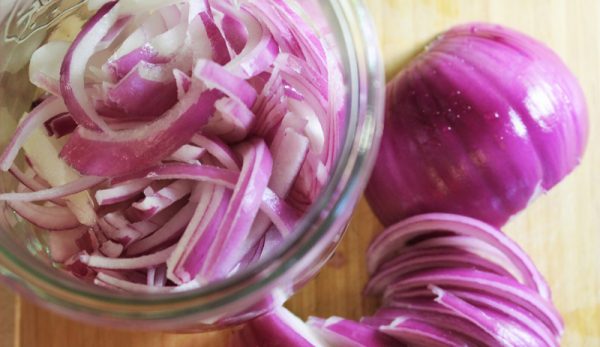
Through the process of fermentation, vegetables become partially broken down. This makes it easier for your body to digest, as well as making the vitamins and nutrients more readily available for your body to absorb.
Plus, fermented veggies offer beneficial bacteria called probiotics. The probiotics that are found in fermented vegetables are the same ones found naturally occurring in your gut biome.
Eating a variety of good-belly bacteria is especially important for your gut health and strengthens your immune system.
Not only are fermented vegetables good for you, but they are also delicious. They have a sour and tangy flavor that cannot be obtained any way other than through the process of fermentation.
Making your own fermented foods allows you to tailor recipes to your liking. Add more of what you like and less of what you do not. Making your own ferments is also much more affordable than buying them premade.
Here is a delicious and simple recipe for pickled onions that is perfect for a beginner. You’ll find endless ways to use up this flavor-packed condiment.
Read more: Check out these 10 tips for getting started with fermentation.
Simple Fermented Pickled Onions
These fermented onion pickles are excellent on sandwiches (especially pulled pork or burgers) or served over fish. They are great on tacos and delicious mixed into salads.
Yield: 1 quart jar
Ingredients
- 3.5 cups red onions, (1-2 large red onions), peeled, sliced 1/4 to 1/8 inches thick
- 1/2 tsp. whole black peppercorns
- 2 cloves garlic, crushed
- 1 bay leaf
- 1 tbsp. coarse kosher salt, dissolved in 2 cups water (for the brine)
Prep all ingredients and pack them into a clean quart jar. Add the garlic and peppercorns first, then onion slices, with the bay leaf gently tucked into the side of the jar.
Mix the brine ingredients together and pour the brine over the onions until they are completely submerged. Make sure to leave 1 to 2 inches of headspace from the brine level to the rim of the jar.
If you have a small fermentation jar weight, add it to the jar to keep the ingredients completely submerged under the brine.
Add the Mason jar canning lid and ring, and tightly screw it onto the jar.
Fermentation
This is a 7-day ferment. Ferment at room temperature, ideally between 60 to 75 degrees F (15 to 23 degrees C), and keep out of direct sunlight. Check on the ferment daily to make sure the brine stays over the produce. This is a crucial step in all vegetable fermentation, as any produce above the brine level is prone to mold.
If the produce sticks above the brine, use a clean utensil to push the produce back below the brine. Burp the jar daily—unscrew the lid briefly and tighten it back on to allow any built-up gas to release (and avoid jar breakage).
After one week, taste test the onion pickles and determine if the flavor is ideal. If so, transfer the jar into the refrigerator, with brine and all.
If the onions still taste too raw, allow them to ferment on the counter another day or two. This ferment will last nearly indefinitely, though the texture and flavors continue to change. Fermentation does not stop once refrigerated—it just slows way down.
Read more: Fall in love with garden-grown bunching onions!
A Few Side Notes
If you do not have a glass jar weight, you can improvise by using an easily removable small glass dish that fits inside the jar. Or, if you have a smaller glass jar that can fit into the mouth of the jar you are fermenting with, you can fill it with water, add a lid and use it to keep the onion slices submerged under the brine.
Just don’t submerge the entire jar within the ferment. You don’t want the brine to touch the metal ring.
If you are unsure if your water is safe for fermentation, you can boil it and allow it to cool to room temperature before adding in the salt to make your brine.
You may use fine sea salt instead of coarse kosher salt if you prefer. Just adjust the onion pickles recipe to 1 1/4 tbsp. fine sea salt.
This recipe has been adapted from WECK Small-Batch Preserving (2018) with permission from Skyhorse Publishing, Inc.




